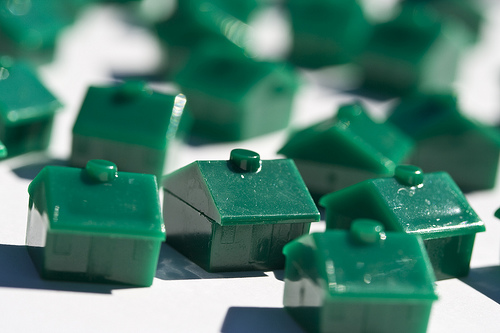Knowing how much homes similar to yours, called comparable sales (or in real estate lingo, “comps”) sold for gives you the best idea of the current estimated value of your home. The trick is finding sales that closely match yours. What makes a good comparable sale?
Your best comparable sale is the same model as your house in the same subdivision—and it closed within the last week. When I am preparing a CMA (Comparative Market Analysis) for one of my Sellers, I only look at comps 6 months back. Any further and the data may be irrelevant. If there have been several sales in the neighborhood, I look only 3 months back because this is the same data that appraisers use, and most buyers must finance and have an appraisal to qualify for a government backed loan. If you can’t find that, here are other factors that count:
Location: The closer to your house the better, but don’t just use any comparable sale within a mile radius. A good comparable sale is a house in your neighborhood, your subdivision, on the same type of street as your house, and in your school district.
Home type: Try to find comparable sales that are like your home in style, construction material, square footage, number of bedrooms and baths, basement (having one and whether it’s finished), finishes, and yard size.
Amenities and upgrades: Is the kitchen new? Does the comparable sale house have full A/C? Is there crown molding, a deck, or a pool? Does your community have the same amenities (pool, workout room, walking trails, etc.) and homeowners association fees?
Date of sale: You may want to use a comparable sale from two years ago when the market was high, but that won’t fly. Most buyers use government-guaranteed mortgages, and those lending programs say comparable sales can be no older than 90 days.
Sales sweeteners: Did the comparable-sale sellers give the buyers downpayment assistance, closing costs, or a free television? You have to reduce the value of any comparable sale to account for any deal sweeteners. Agents can help adjust price based on insider insights.
Even if you live in a subdivision, your home will always be different from your neighbors’. Evaluating those differences—like the fact that your home has one more bedroom than the comparables or a basement office—is one of the ways real estate agents add value.
An active agent who has been inside a lot of homes in your neighborhood knows all sorts of details about comparable sales. She has read the comments the selling agent put into the MLS, seen the ugly wallpaper, and heard what other REALTORS®, lenders, closing agents, and appraisers said about the comparable sale.
More ways to pick a home listing price
If you’re still having trouble picking out a listing price for your home, look at the current competition (i.e. real estate lingo – “Actives”). Ask your real estate agent to be honest about your home and the other homes on the market (and then listen to her without taking the criticism personally).
Next, put your comparable sales into two piles: more expensive and less expensive. What makes your home more valuable than the cheaper comparable sales and less valuable than the pricier comparable sales?
Are foreclosures and short sales comparables?
If one or more of your comparable sales was a foreclosed home or a short sale (a home that sold for less money than the owners owed on the mortgage), ask your real estate agent how to treat those comps. In the Tampa/St. Petersburg market, we almost always have to use these homes as comps because they make up such a large percentage of our market. However, if the foreclosure/short sale was in very bad condition, this may mean your home is worth more. Again, consult your real estate agent.
How much short sales are discounted from their market value varies among local markets. The average short-sale home in Omaha in recent years was discounted by 8.5%, according to a University of Nebraska at Omaha study. In suburban Washington, D.C., sellers typically discount short-sale homes by 3% to 5% to get them quickly sold, real estate agents report. In other markets, sellers price short sales the same as other homes in the neighborhood. I would say that in Tampa Bay – most short sales are priced relatively closely to other homes in the neighborhood and should not be discounted much more than 3% to 5% depending on the condition of the comp compared to your home.
Rely on a full-time professional REALTOR’s® knowledge of the local market to help price your home competitively. Whatever you do – don’t believe ZILLOW’s Zestimate! I can’t tell you how many clients have said to me “But Zillow says my house is worth $300K, and you are telling us its worth $250K? How can that be?” Zillow has a 14.6% margin of error in Tampa Bay. Zillow cannot tell which homes had a completely remodeled kitchen and baths, and which ones did not. Nor does it take into consideration that one condo may have an oceanfront view while another has a parking lot view. Please do not rely on a computer program to tell you the value of your home. No one wants a 14.6% margin of error when it comes to pricing their home!
Our research shows that homes that are priced over market value to start with typically receive more low-ball offers and eventually sell for less than homes priced at market value to start with. I recently listed and subsequently sold a few homes in under 30 days that were priced at market value and we received multiple offers, driving the price over our original asking!
If you are thinking about Listing your Tampa home for sale – please contact us for a free, no obligation market analysis of what your home may be worth in today’s market.



Leave a Reply